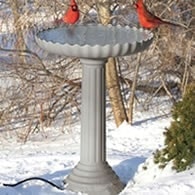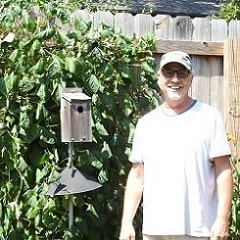Carolina Wren Nesting Under Lid of Propane Tank
by Katie Allen
(Colfax, Indiana)
Wrens nesting under propane tank lids? It’s more common than you think! Here are two firsthand accounts of unexpected bird nests.
Wren Nest Discovery
My 3-year-old daughter and I were outside when I decided to check the gauge on the propane tank, knowing we would need it filled soon.
When we opened the lid we were surprised to find two eggs in a nest.

Carolina Wren Nest
A few days later we went back to check on them and there were four, and as I suspected we were also low on gas.
When I went to the gas company to have them refill I asked if they could try not to bother the nest.
The lady laughed at me and said she would write in on the order but the person refilling it would probably laugh too. She said that it happens "all the time."
Two days later the guy showed up to fill the tank. He told me to leave the lid open and in a few days come and knock the nest out.
I said "sure" and as soon as he pulled out of the driveway I put the lid back down. I was afraid the dove would abandon the nest after that.
However, they've been coming back to the nest.
My daughter and I eagerly await the babies to hatch.
We have been doing our research on Carolina Wrens and have learned a lot.
Since this discovery we have also found a robin's nest we check on as well.
It's wonderful that she is so excited to learn about the mourning doves (and Robins) and their life cycle.
Comments for Carolina Wren Nesting Under Lid of Propane Tank
|
||
|
||
|
Click here to add your own comments Join in and write your own page! It's easy to do. How? Simply click here to return to House Wrens. |
Wrens Nest on Propane Lid
by Patti Vyzralek
(Pagosa Springs, CO, USA)

Nest Under Propane Tank Lid
Patti has some questions about wrens building a nest under the lid of their propane tank. Is it safe? Tell us all what you think. Has this happened to you?
When my husband went out to check the propane level in our tank next to the house in the second week of June, he noticed quite a bit of debris seemingly coming out from under the lid.
He gingerly lifted the hinged domed top not knowing what to expect.
Neatly woven around the knobs and dials of the tank were assorted twigs, sticks, pine needles, and bluebird feathers.
The debris field presented all the earmarks of a wren's creation. Tucked away in a cylindrical depression within the nest were 7 tiny eggs.
Since wrens choose unusual places in which to build nests, we are not too surprised that the bird parents chose the propane tank.
It features a nice arching cover and good protection from predators.
In addition, access in and out of the nest is easy for the wrens through a small arch where the fuel hose exits.
With all of the tank's location benefits, we are quite concerned that the nursery under the lid was ultimately a poor choice.
We've not heard or seen activity from the parents lately.
During the day the tank can become quite warm and a little too intense to serve as a proper incubator.
But we will keep watch and hopefully our tenants have not left due to "wrenter's" remorse.
Comments for Wrens Nest on Propane Lid
|
||
|
||
|
||
|
Click here to add your own comments Join in and write your own page! It's easy to do. How? Simply click here to return to House Wrens. |









